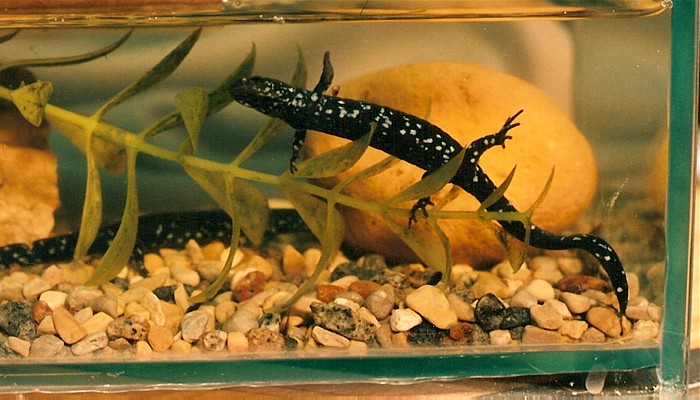Dorsal or back side of the salamander.
Marbled salamander defense.
Marbled salamanders grow to about 3 5 4 25 in 9 10 7 cm in size and are stout bodied and chubby in appearance.
The diet of adult marbled salamanders includes earthworms insects crickets ants snails and slugs.
Orifice past the hind legs of a salamander costal grooves.
The marbled salamander is a stocky boldly banded salamander.
Both males and females typically migrate to the area surrounding a dry vernal pool in september and october.
This secretive salamander spends most of its time under rocks logs or forest debris preferring forested areas.
The marbled salamander varies in length from 9 10 7 cm 3 5 4 2 in.
Like most of the mole salamanders it is secretive spending most of its life under logs or in burrows.
They can be identified by their black dark brown body including its venter with light white silvery crossbands on the dorsum.
This species is sexually dimorphic males tend to have white crossbands and females tend to have gray silvery crossbands.
It may also occur in open sandy woods and on rocky dry hillsides.
Marbled salamanders are late summer to early fall breeders.
Skin glands on neck back and shoulder which secretes neurotoxin for defense mechanism.
Muscular tail used for swimming.
Marbled salamander in boone county.
The tail of the salamander has the ability to be removed without hurting the salamander itself well the tail is removed and wriggles about in front of a predator the salamander can run away and seek a place to.
How to setup a simple but effective terrarium for a marbled salamander or any salamander that requires cool temperatures and moist conditions.
The latin word opacum means shaded dark obscure or dim and refers to the adult dorsal color pattern.
The marbled salamander is one of many amphibians found in the bottomland hardwood forests of mississippi.
A small stout bodied salamander this species is easily identified by its distinct black and white patterning across its entire body.
Fore limb usually possess 4 toes.
Adults can grow to about 11 cm 4 in small compared to other members of its genus.
Hind limb usually possess 5 toes.
Salamander larvae feed on plankton and aquatic insects.
This and many other amphibians require small fishless woodland.
Marbled salamanders spend most of their lives in self excavated burrows or those dug by small mammals and are most commonly found in deciduous or mixed pine forests on sandy soil.
The deep spaces between the ribs for blood vessels and nerves.
Marbled salamanders and the department of defense the marbled salamander ambystoma opacum is one of the more commonly found mole salamanders on military installations.

